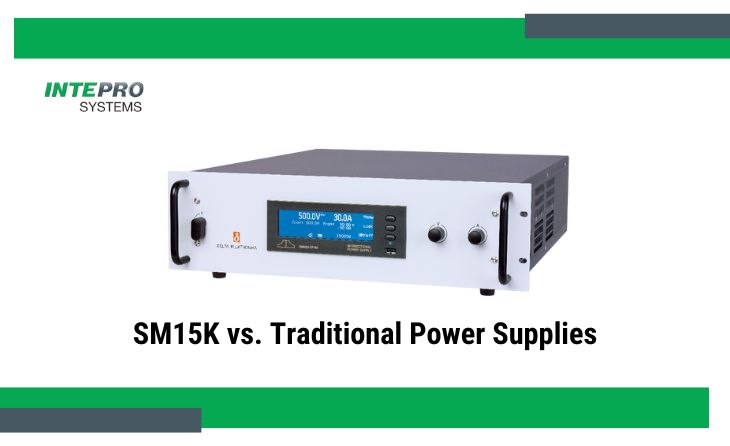Press Releases
Intepro Systems News
SM15K vs. Traditional Power Supplies: Energy Savings & Efficiency Gains Explained

Test and manufacturing engineers face mounting pressure to reduce operational costs while maintaining precision in their automated test equipment setups. Traditional DC power test instruments (DC Power Supply or DC Resistive Load) typically feature unidirectional energy flow and limited efficiency, which creates significant operational bottlenecks and energy waste. The Delta SM15K DC Power Supply represents a fundamental shift in how DC power test instruments approach energy management by offering regenerative capabilities and efficiencies that traditional systems cannot match, all while combining two instruments into one. Unlike conventional resistive DC loads that dissipate absorbed energy as heat, SM15K returns energy to the grid, achieving regeneration levels exceeding 95%. When operating as a power supply, SM15K offers PFC >0.99 and an operating efficiency of 96%. This post explores the limitations of traditional power test instruments and technical advantages of the SM15K series such as specific efficiency metrics, cost reduction potential, and future-proofing benefits for modern test environments.
Limitations of Traditional Power Supplies
Conventional DC power test instruments operate with fundamental design constraints that impact both performance and cost effectiveness. These limitations become particularly problematic in high-use testing scenarios where energy efficiency directly affects operational budgets. Here are some limitations.
• Energy Waste Through Heat Generation: Conventional electronic loads convert the loaded energy into heat rather than recovering it, creating substantial waste in battery testing and electronic device validation. This inefficiency becomes costly in extended test cycles where power consumption can reach significant levels. The heat generation also requires increased usage of cooling systems, further increasing operational expenses.
• Limited Flexibility in Test Configurations: Standard power testing equipment lacks bidirectional capabilities, restricting test engineers to unidirectional power flow scenarios. This limitation prevents comprehensive testing of energy storage systems and regenerative technologies. The use of bidirectional devices reduces instrument complexity and test time.
• Maintenance Requirements and Downtime: Traditional power test instruments generate significant heat, leading to component stress and frequent maintenance cycles. Cooling systems are required to manage thermal loads, which results in greater wear and tear. Extended downtime for repairs disrupts critical testing schedules and project timelines.
Benefits of SM15K
The Delta SM15K DC power supply addresses traditional limitations through advanced bi-directional power supply technology and intelligent energy management.
• Regenerative Energy Recovery: SM15K's bidirectional capability allows energy absorption back into the electrical grid during discharge cycles, dramatically reducing overall power consumption. During battery testing scenarios, discharged energy is returned to the grid rather than dissipating as heat. Energy regeneration reduces energy costs in various test scenarios. This technology particularly benefits automotive manufacturers testing electric vehicle batteries and aerospace companies validating power systems.
• Efficiency Metrics: Efficiency ratings of Delta SM15K reach up to 95% during both source and sink operations, significantly exceeding traditional power supply performance. This high efficiency translates directly into reduced heat generation as well as cooling requirements. The improved efficiency metrics allow test facilities to increase testing capacity without proportional increases in facility power infrastructure. Advanced power factor correction ensures optimal grid utilization and reduced electrical system stress.
• Operational and Maintenance Cost Reductions: Lower heat generation extends component lifespan and reduces maintenance frequency compared to conventional DC power systems. SM15K's intelligent thermal management eliminates the need for extensive cooling systems in many applications. Reduced maintenance intervals mean fewer scheduled downtime periods and improved test schedule reliability. The combination of energy savings and reduced maintenance creates substantial long-term cost advantages for automated test equipment installations.
• Future-Proofing Test Setups: Programmable DC power supply capabilities ensure adaptability to evolving test requirements without hardware replacement. SM15K's auto-ranging output accommodates various voltage and current combinations at full rated power. Software-based control systems allow remote operation and integration with existing test automation frameworks. This adaptability protects capital investments while enabling expanded testing capabilities as technology requirements change.
• Advanced Control and Monitoring: Real-time monitoring capabilities provide detailed insights into energy consumption patterns and system performance metrics. Delta SM15K integrates seamlessly with existing test systems through multiple communication interfaces. Precise control algorithms ensure stable output characteristics even during dynamic load conditions. These monitoring features enable data-driven optimization of test procedures and energy management strategies.
The Delta SM15K DC power supply device offers significant energy savings and efficiency gains. Its regenerative technology, 95%+ efficiency, auto-ranging flexibility, and programmability make it ideal for aerospace, automotive, and defense testing applications. With a scalable, future-ready design, it ensures long-term value.
Contact Intepro Systems for customized solutions and global support to transform your power testing with SM15K.
Company Contact:
Intepro Systems, Inc.
Andrew Engler
(714) 953-2686 1
4662-E Franklin Avenue,
Tustin, CA 92780
Agency Contact:
Futurism Technologies, Inc.
30 Knightsbridge Road, Suite 525, Piscataway, New Jersey 08854, USA.
Tel: +1 (732) 790-2938
Fax: +1 (302) 351-8845
Products
Support
Company

